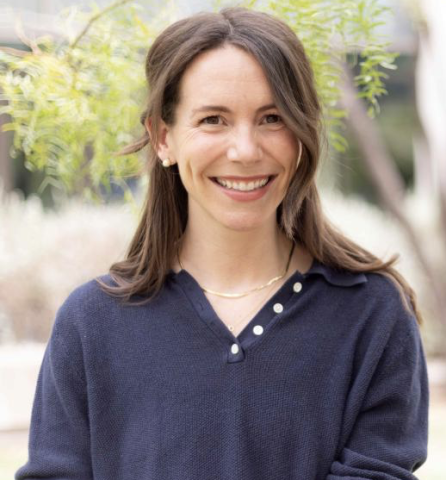
Assistant Professor Samantha Shorey’s fascination with technology began not in a research lab, but on Tumblr. In the wake of the 2008 recession, she watched as women turned to blogging to share stories, build community, and find creative ways to navigate a shifting economy. That experience sparked a lasting interest in how people use technology to innovate—not just in technical terms, but socially and emotionally. Now a faculty member in the Department of Communication, Dr. Shorey studies the human side of emerging technologies like AI and robotics, focusing on how innovation unfolds in everyday workplaces and how it reshapes the way we think about labor, creativity and the possibility of building a more just future.
That commitment to grounding technology in lived experience began with her own story. As a young college graduate navigating the 2008 recession and its limited job market, Shorey saw the internet emerge as both a creative outlet and survival strategy.
“I got interested in technology in the 2010s when people were having this really special moment of experience with the internet,” Shorey said, “I was blown away by how creative people were with technology.”
What started as a fascination with digital creativity has grown into a career-long commitment to understanding how people live with emerging technologies. Humans’ relationship with these tools remains at the core of Shorey’s research, focusing on the complex ways people interact with physical and digital technologies in their daily lives .
“I've stayed interested in the way people talk about emerging technologies,” Shorey said. “It’s always more complicated when we look at what people are doing on the ground.”
Recently, those questions have taken Shorey into the workplace, where the stakes of technological changes are especially visible. She investigates workers’ attitudes towards the role that physical technologies take on in their professional settings, paying close attention to how narratives of innovation clash with lived experience.
"One of the things that I’m working on right now is how we communicate about robots; we all hear a lot about how they’re going to change the world, or how they’re going to put everyone out of their jobs or make work better for everybody,” Shorey said. “All of us are on the ground having to figure out how to contend with these narratives in our daily practice.”
Rather than framing AI and automation as either a threat or a fix-all solution, Shorey highlights the subtler shifts workers experience as their roles evolve.
“Our work is changing as a result of AI but not in the sense that it’s putting us out of our jobs or that it is a magical fix to everything we don’t like about our jobs. It’s not that work is being totally replaced, but it’s being shifted and pushed into different places,” Shorey said. “I think it’s really important for us to talk about this because sometimes the parts of our jobs that we love the most, the creative parts, are getting taken away and instead what we’re left to do is kind of oversee and correct the robot.”
This focus on labor and its shifting value has shaped how Shorey views her place at Pitt. Since arriving, she has gained a deep appreciation for Pittsburgh’s history as a city built on work.
“I am really excited to be here at Pitt because I study labor and Pittsburgh is a town that has, at its core, a commitment to how important work is to people’s lives,” Shorey said. “The University itself is dedicated to making sure that people who work hard and people who make our world work have access to a world class education. Everybody deserves that, especially people in our direct community. It’s really special to be a part of a university that is dedicated to serving its local community in this way.”
Looking ahead, Shorey hopes to carry the same commitment into her teaching. Just as her research helps reframe workers' experiences with physical technologies, she hopes students will leave her classroom with a sense of agency about the future.
“I hope that through my time here that the students I work with will leave with a sense of informed empowerment about the future,” Shorey said. “I really want students to know that things like AI aren’t inevitable, they’re not natural forces and our political world isn’t predetermined. We all have the tools to make the changes that they want to see in the world.”
